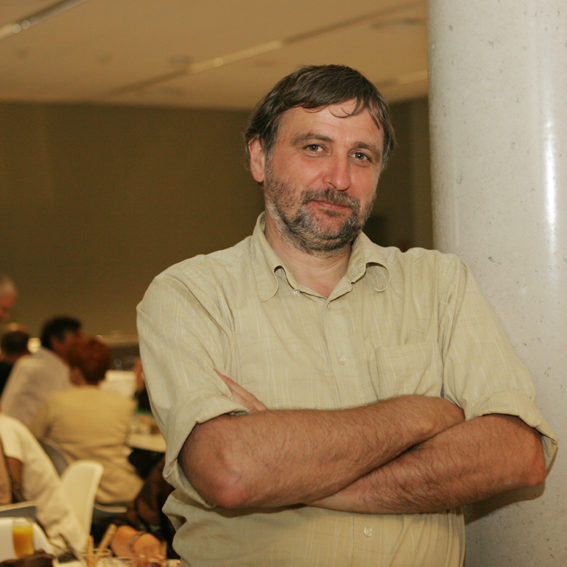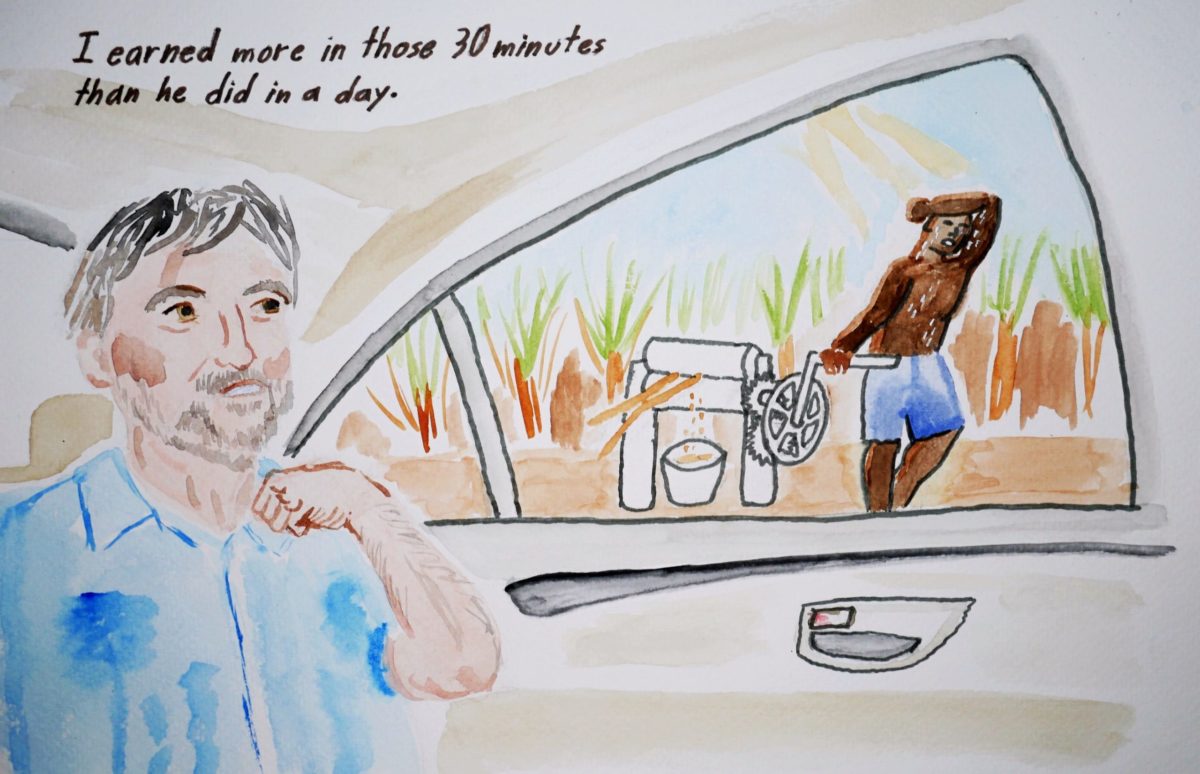llustration by CIDSE communications officer Anya Frances Verkamp
Dirk Van der Roost spent most of his career in development cooperation: with Médecins sans Frontières, at the Cabinet of the State Secretary of Development Cooperation, and at the Antwerp Institute of Tropical Medicine. Since the end of 2012 he works at Broederlijk Delen, first as head of the International Department, and now as policy advisor on sustainability and system change.
In this blog, he reflects on the work so far on sustainability and ecological footprint at Broederlijk Delen and on how this work links to their broader systemic change approach.
How did the work on ecological footprint start at Broederlijk Delen? What has been your involvement?
Broederlijk Delen established a task force on ‘Green policy’ in 2010 as part of its corporate social responsibility. At the time, there was also a sensitivity from a number of staff to ensure coherence in our organisation and to make sure that we also ‘walk the talk’ when it comes to environmental sustainability. Since 2016, I have been coordinating this task force. It is composed of highly motivated colleagues and is strongly supported by the management of our organisation. This motivation and support facilitated the organisation of different activities and the development of several policies. Thanks to this group for example, Broederlijk Delen has an action plan (2018-2021) in place to work on Green policy.
What do you see as key steps that Broederlijk Delen has been able to take in this work on sustainability and ecological footprint? What do you take pride in, personally?
We have been able to establish an active and committed staff working group on Green policy, which represents relevant parts of our organisation. On a yearly basis, we publish our main environmental and social indicators and policies. We have been able to set up an internal communication system to keep staff informed and motivated about green practices, at work and in their private life. We adopted policies and practices on sustainable food, environmentally-friendly domestic, European and intercontinental travel and we also signed Ecokerk’s Laudato Si’ initiative on divesting. I’m proud to say that the ‘Green policy’ has become central in our organisation.
What was the area in which it was the most difficult to make a change?
The most difficult area to make a change is clearly international travel. One of the most important reasons for this is the tension between the need for direct contact with international partners and allies and the emissions that it generates. International travel has always been 80 or 90% of our emissions, however, the added value of bringing people together to discuss and exchange has been so clear, especially in our advocacy work. Since it is our main objective, the social purpose of our organisation, we must travel but we need to do it in a conscious way. Step by step we have been able to come up with a clear policy that allows us to better balance the advantages of travelling with the negative environmental impact. This year, we started using more intensively online tools for communication and virtual meetings. We have learnt that we can avoid certain travels just by connecting people online, especially in our work with partners in the Global South. We, for example, had inputs from some of them during seminars and panel debates in Belgium online. It created a lot of potential for our volunteers to meet and exchange with our partners directly online, instead of having us being advocates for them.
How does the work on ecological footprint contribute to the systemic change work at Broederlijk Delen?
For us, the internal work on ecological footprint is somehow a reality check. I have already mentioned the area of international travel. We are calling for drastic cuts in greenhouse gas emissions to tackle climate change. At EU level, at least 55% less emissions by 2030. But, can we do it ourselves, can we reduce our emissions by 55% by 2030? At the moment, there is not a 100% commitment of the organisation to get there, because we don’t know if we can do it. So that is one kind of reality check.
Another example of a reality check is related to agroecology. We are promoting food through agroecological production. However, the food we use within our organisation, like the soup at noon, food for meetings and so on,does that come from agroecological production? It is not so easy to get it in the city and to be coherent in everything you do. Many colleagues didn’t even know what agroecological production meant. Is it the same as biological or organic food? If not, what is the difference? These kinds of discussions are the same discussions we have with our supporters and our beneficiaries. It triggers us to be realistic and forces us to explain well how we can advance.
Those are just two examples of how your ambitions must stay realistic and you have to go step-by-step. If you can’t do it yourself, then you can’t claim that the whole society should do it.
What in your career and life led you to believe that working on ecological footprint and systemic change are necessary for an organisation?
One anecdote comes straight to my mind: I was once in Uganda; it must have been in 1998. At the time, I worked for an NGO federation. During one of my field visits, I saw a sugar-cane worker who was pressing the cane to squeeze out the juice, capturing it in a big recipient. The sun was shining on his body – he wore a little short and his chest was bare – he sweated the whole time and he was working incessantly … After a full day of delivering heavy physical work to ‘please’ the big owner of the farm, he maybe got a few dollars or Ugandan shillings for his job. And I had arrived in a four-wheel drive car , suffering because it was hot in the car. I had been sitting there for about 30 minutes, with a little bag of paper next to me, observing him and his work. During those 30 minutes, my salary was higher than the daily salary of this man who did heavy physical labor. For me, this was such a strong image of the inequality which is built into our world and has grown in our societies during hundreds of years.
Even if we are doing advocacy work and we are activists, it is not balanced at all and I think it is good to be well aware of this. Witnessing extreme poverty directly and being confronted with people trying to survive convinces you that big changes are needed. In the last years, our insights into how the world works and what should be done have improved a lot, thanks to the knowledge which is advancing. It is clear that the system has to change drastically, that economic growth cannot lead to solutions and so on.

Head of the International Department at Broederlijk Delen

